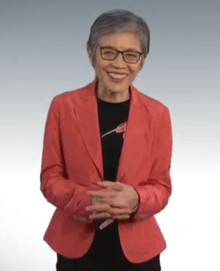Virginia Man-Yee Lee
Virginia Man-Yee Lee (born 1945) is a Chinese-born American neuropathologist who specializes in the research of Alzheimer's disease. She is the John H. Ware 3rd Professor in Alzheimer's Research in the Department of Pathology and Laboratory Medicine at the Perelman School of Medicine at the University of Pennsylvania, and Director of the Center for Neurodegenerative Disease Research and Co-director of the Marian S. Ware Alzheimer Drug Discovery Program.[1] She was awarded the 2020 Breakthrough Prize in Life Sciences.

Life and career
Lee was born in 1945[2] in Chongqing, Republic of China, and moved to Hong Kong with her family at age five. She received a Chinese education before moving to a high school with English as its language of instruction.[3]
Lee studied piano at the Royal Academy of Music in London (1962–1964), and then obtained an MS in Biochemistry from the University of London in 1968 and a PhD in Biochemistry from the University of California at San Francisco in 1973. She was a postdoctoral fellow at the Rudolf Magnus Institute of the University of Utrecht in the Netherlands (1973–1974) and at Children's Hospital Medical Center and Harvard Medical School in Boston (1974–1979) where she met her husband, John Trojanowski.
She then was appointed Associate Senior Research Investigator at Smith-Kline & French, Inc. (now called GlaxoSmithKline) in Philadelphia from 1979-1980. After not being able to pursue her passion in neuroscience, she joined the faculty of the Department of Pathology and Laboratory Medicine at the Perelman School of Medicine of the University of Pennsylvania in 1981, attaining the rank of Professor in 1989. Here, she teamed up with Trojanowski to study brain samples for signs of disease. She also received an MBA in 1984 from the Executive MBA program at the Wharton School of the University of Pennsylvania just in case her research career was not successful.
Lee and her husband currently oversee a lab with about 50 employees, publishing 15 to 20 studies per year.
Research
Dr. Lee’s research focuses on proteins that form pathological inclusions in Alzheimer’s disease (AD), Parkinson’s disease (PD), frontotemporal degeneration (FTD), amyotrophic lateral sclerosis (ALS) and related neurodegenerative disorders. Her work demonstrated that tau, alpha-synuclein and TDP-43 proteins form unique inclusions in neurodegenerative diseases and that aggregation of these proteins is a common mechanistic theme in AD, PD, FTLD, ALS and related disorders. Significantly, Dr. Lee’s studies implicated the abnormal aggregation of tau, alpha-synuclein and TDP-43 in mechanisms that compromise neuronal viability. Major accomplishments include discovery of tau, alpha-synuclein and TDP-43 as the diseases proteins in AD, PD and ALS/FTD, respectively, elucidating the roles of these proteins in neurodegeneration, pursuing pathological tau as a target for AD and FTD drug discovery, and how the transmission of pathological tau and alpha-synuclein explains the progression of AD and PD. Most importantly, this research has opened up new avenues of research to identify targets for drug discovery to develop better treatments for these disorders. Because of the broad impact of her research, Dr. Lee’s h-index is 150 and she is listed among the 10 most highly cited AD researchers from 1985-2008 (JAD, 16:451-465, 2009) as well as among the top 400 most highly influential biomedical researchers from 1996-2011 (Eur J Clin Invest, 43:1339-1365, 2014). ISI has recognized Dr. Lee as an ISI Highly Cited Researcher which places her in the top 10 most highly cited neuroscientists from 1997 to 2007[4]
Awards
Among other distinctions, Lee won both the Pasarow Award in neuropsychiatry and the John Scott Award in 2012. [5] She was awarded the 2020 Breakthrough Prize in Life Sciences for which she was awarded $3 million that she plans to spend on continuing her research.
- 1991 Metropolitan Life Foundation Award for Alzheimer Disease Research[1]
- 1991-1994 Zenith Award for Alzheimer's Disease Research, Alzheimer's Association, Inc[1]
- 1992 Allied Signal Award for Aging Research[1]
- 1997 Rita Hayworth Award for Medical Research in Alzheimer's Disease[1]
- 1998 Potamkin Prize for Medical Research in Alzheimer's Disease[1]
- 2000 Stanley Cohen Biomedical Research Award[1]
- 2004-present AAUW Founders Distinguished Senior Scholar Award[1]
- 2008 Franklin Founder Award 2008: Celebrating Women in Science[1]
- 2009 Life Time Achievement Award in Alzheimer’s Disease Research, Alzheimer’s Association[1]
- 2012 John Scott Award[1]
- 2013 10th Parkinson Society Canada’s Donald Calne Award and Lectureship[1]
- 2018 Robert A. Pritzker Award for Leadership in Parkinson’s Disease Research from the Michael J. Fox Foundation[1]
- 2018 Helis Foundation Award for Parkinson’s and Neurodegenerative Disease Research[1]
- 2020 Breakthrough Prize in Life Sciences[1]
- May 2020 The Times 'Science Power List'[6]
References
- "Virginia Man-Yee Lee". Perelman School of Medicine at the University of Pennsylvania. Retrieved 2019-09-08.
- "Members of the American Academy of Arts & Sciences: 1780–2017" (PDF). American Academy of Arts and Sciences. Retrieved 2019-09-08.
- Mukhopadhyay, Rajendrani (August 2013). "Virginia Lee: notes on a career". ASBMB Today. Retrieved 2019-09-08.
- http://archive.sciencewatch.com/ana/st/alz2/authors/. Missing or empty
|title=(help) - "The John Scott Award Recipients". Eugene Garfield at University of Pennsylvania. Retrieved 28 September 2018.
- Franklin-Wallis, Oliver (23 May 2020). "From pandemics to cancer: the science power list". The Times. ISSN 0140-0460. Retrieved 2020-05-26.